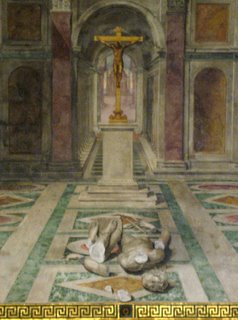On blessing enemies and burning books
In my previous post I mentioned the words of Christ in Luke 6 about loving enemies as one obvious response to this proposal. Loving enemies means the only retaliation we can condone is repaying cursing with blessing, hatred with love, and violence with vulnerable peacemaking. God retaliated against the death of his son by raising him to new life, and by commissioning messengers with the gospel of forgiveness and peace in his name. Burning a book is indeed a powerful form of communication, but the message that is intended by this action is a perversion of the gospel of Christ.
Indeed, there is a deeper and even more worrying assumption behind this action, which is brought to light by asking after the identity of the "we" in Pastor Jones' quote above. Who is it who will bring repay attack for attack? The obvious candidate is the US military acting on behalf of the US government. As well as ignoring the teaching of our Lord, this pastor seems to have confused the church of Jesus Christ with his nation and its military.
Sam Norton has suggested that the popular reaction to this story has been misguided, on the basis that the offensiveness of burning a Qu'ran, or the potential harm it might bring to US soldiers are not properly Christian reasons. It is not the place of the church to ensure the safety of soldiers occupying a foreign country, nor is the giving of offence itself a problem. On these points, he is correct. He goes on to suggest that the burning could be seen as an act of protest or resistance against idolatry. I am not opposed to symbolic actions that expose the hollowness and violence of idolatry. But I don't think this action does that. Not only does Jones' explanation fail to conform to anything like the Christian gospel, but the very act of burning a book - not least the sacred text of a minority community in his society - does not speak of fearlessness, hope or joy. It is a punitive action that attempts to silence speech and intimidate a group already the focus of hostility and suspicion.
As one of Sam's commentators (revsimmy) points out, "In the only New Testament example of book-burning (Acts 19:19) at Ephesus these were books being burned by people who were renouncing their former beliefs and practices (not the case in Pastor Jones' case). Later on in Ephesus, when the silversmiths stir up a riot against Paul, the town clerk is able to claim, with apparent credibility, that Paul and his companions have never spoken against their temple or blasphemed their goddess." This too is an important point. Whatever we make of the book-burning in Acts chapter 19, it was undertaken voluntarily by those who had formerly practiced idolatry as a symbolic, costly and effective break with their old lives. The action planned by Terry Jones for this Saturday, by contrast, is more akin to the destruction of Buddhist statues by the Taliban. The overthrow of idolatry is not through the weapons of this world (whether explosives or cigarette lighters, outrage or censorship), but through preaching, purity and prayer.
The first idolatry that needs to be addressed in this story is not the attitude of Muslims to the Qu'ran, but of Christians to militarism and nationalism. The good news is that liberation from such empty idols is possible in Christ.
UPDATE: It seems that Pastor Jones may have decided to cancel the burning. Or put it on hold. Or something. He seems like quite a confused man.
A typically good reflection on the whole matter from Andrew Cameron in the Social Issues Briefing. He asks "what would St Paul do?" and his answer is that prior to the Damascus Road, Saul of Tarsus would have joined in and led the burning. After meeting Christ, not so much.













